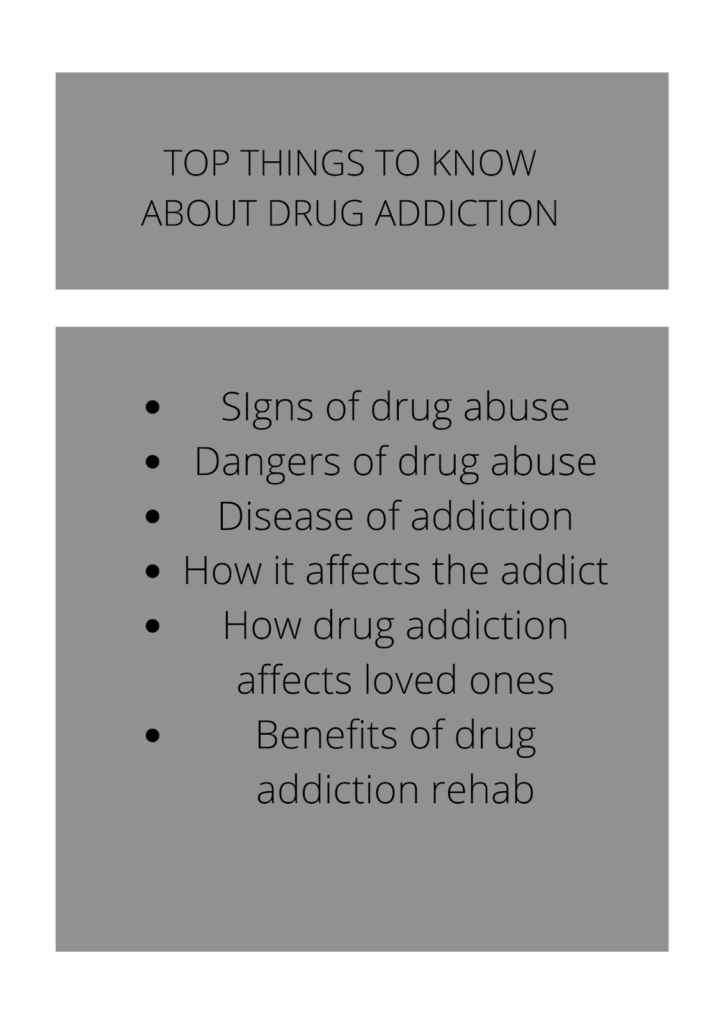Table of Contents
How to Convince my Drug Addicted Relative to Check Into Drug Rehab
At the moment, in the United States, there are more than 20 million people who need substance abuse treatment. Yet, around 80% of those people haven’t gotten drug addiction rehab help. Most of the time, it is because they don’t think they need treatment, even if they can’t stop using drugs on their own.
Do you have a relative who is addicted to drugs? If so, and you want to convince them to check into drug rehab, hopefully, this guide can help you with this goal.
Educate Yourself
Before you talk to your relative about going to drug addiction rehab, it is important to learn about addiction for yourself. You will want to approach this conversation with facts and not just your opinions or thoughts about it. What are some things you will want to know about drug addiction?

Now that you know what you should learn about drug addiction, you can start preparing yourself. You should read literature, website content, talk to addiction recovery professionals and go to support groups in your area or online. By doing all these things, you can equip yourself with the answers you are looking for and with any answers that your relative may have about drug rehab. You will also be able to guide the conversation much more level-headed.
Don’t forget that it would also be a good idea to have an addiction rehab program set up in case your relative is willing to start treatment.
Plan the Intervention
The intervention is another important part of convincing your relative to check into drug addiction rehab. This will require you, friends and family members to come together to discuss your relative’s addiction. You will need to get your relative to attend this intervention, as well, although it is good to meet ahead with everyone else to discuss what is going to be said first. A lot of the time, just seeing all these people at the intervention that care about your relative, will be enough to prompt them to go to rehab.
However, it is still important to plan the intervention ahead of time and to pick a time when your relative is most likely in a sober state. If they are under the influence of drugs, they are much less likely to admit they have an addiction, as odd as that may seem.
In addition to the intervention, it is crucial that you have a post-intervention strategy which should include:
- Which rehab program your relative will go to if they agree to check into one
- Pack a bag for your relative in case they are ready to leave at that moment (so, they don’t change their mind)
- What will happen (consequences or ultimatums) if they aren’t willing to go to rehab
If you can have these things prepared before holding the intervention, it can greatly help to smooth things out when it is time for the intervention.

Avoid Negative Attitudes and Emotions
Surely, you are going to be full of emotions when it comes time for the intervention. However, no matter what emotions or attitudes are running through you, it is important to avoid negative ones. No matter how badly you have been hurt by your relative’s addiction or how angry you are at them, you won’t convince them to go to rehab by yelling or raising your voice.
Rather, it is best to let your relative know that this intervention is held from a place of care, support and love. You only want what is best for them which is why you are recommending a drug addiction rehab program. You want to see them live their best, happiest, safest and healthiest life.
Be sure to reiterate how much you love and care for them and let them speak, too. Don’t interrupt when they are talking as that can bring about defensiveness which isn’t what you want. You can let your relative know that they have hurt you, but do so with forgiveness in your heart and words. It is also best to use “I feel” statements instead of “You did this” statements.
Consider Holding a Professional Intervention
If you are still unsure about holding an intervention, it may be a good idea to hold a professional intervention. There are intervention specialists who are very effective with what they do. They know all about addiction, how it affects families and how to best talk to the addict, too. If this is something you are wondering about, don’t hesitate to reach out to a professional interventionist today. The sooner, the better.
Don’t Wait Any Longer
It is vital that you don’t wait any longer to start planning this intervention. There are many people who will wait until their relative hits rock bottom, but the truth is, at that point it may be too late. There are millions of people who die due to drug overdose, driving while under the influence of drugs or due to health issues related to drug abuse. Don’t wait until it is too late. If you suspect or know your relative is abusing drugs, now is the time to plan an intervention and talk to them. The longer you wait, the less life your relative has to live.
Can You Make Your Relative Go to Drug Addiction Rehab?
What happens if your relative doesn’t want to listen to what you and their friends and family members have to say? What happens if they aren’t ready to quit using drugs? There are still some things you can do to get them the support and help needed. If your relative is an addicted teenager, you can get them into a drug rehab without their permission. If your relative is in legal trouble or poses a danger to themselves or others, they can legally be forced into a treatment program via involuntary commitment or court-ordered drug rehab.
It is important to know that even if your relative doesn’t want to get help, they can still reap the benefits of it. It is a myth that people have to want to get clean in order to benefit from it. The truth is that at first addicts don’t want to give up drugs. Their body and mind have come to rely on them. They are skeptical that life can be lived without the use of drugs. However, once they get into a drug addiction treatment program and see all the ways that life is better without drugs, they often come around to the recovery process.
Before you try the legal course of action, it is best to hold an intervention, though. If you can get your relative into a treatment program based on their own free will, that is always the best start. However, if you can’t there are professional and legal courses of action that may be necessary.
If your relative is ready to enter a drug rehab program, reach out to our Blue Hills Recovery team today.
This post is very easy to read and understand without leaving any details out. Great work! Thanks for sharing this valuable and helpful article.
Thank you for sharing this compassionate and informative post. Convincing a drug-addicted relative to seek help can be a difficult journey, but it’s essential to never give up on them. The tips and advice provided here offer a thoughtful approach to approaching the conversation with empathy and understanding. Let’s continue supporting those struggling with addiction and guiding them towards a path of healing and recovery. Together, we can make a difference in their lives.
This was a great and interesting article to read. I have really enjoyed all of this very cool and fun information. Thanks
This post is very easy to read and understand without leaving any details out. Great work! Thanks for sharing this valuable and helpful article.
This post is very easy to read and understand without leaving any details out. Great work! Thanks for sharing this valuable and helpful article.